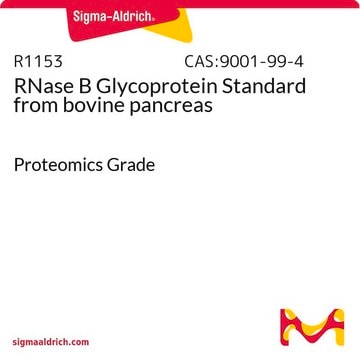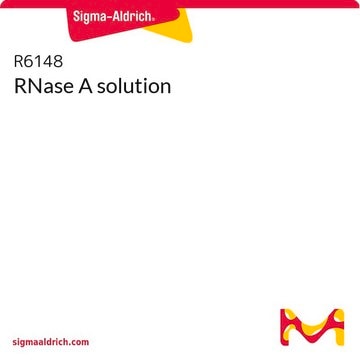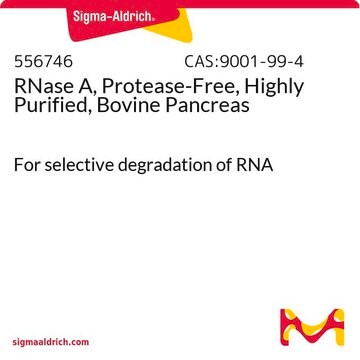R5500
Ribonuclease A from bovine pancreas
Type XII-A, ≥90% (SDS-PAGE), 75-125 Kunitz units/mg protein
Synonym(s):
Pancreatic Ribonuclease, RNAsea, RNase A, Ribonucleate 3′-pyrimidinooligonucleotidohydrolase
About This Item
Recommended Products
biological source
bovine pancreas
Quality Level
type
Type XII-A
Assay
≥90% (SDS-PAGE)
form
lyophilized powder
specific activity
75-125 Kunitz units/mg protein
mol wt
~13,700
technique(s)
cell based assay: suitable
impurities
salt, essentially free
suitability
suitable for mRNA or total RNA extracted from cells and tissues
application(s)
diagnostic assay manufacturing
foreign activity
protease, essentially free
storage temp.
−20°C
SMILES string
[nH]1cnc(c1)CC(NC(=O)CCN)C(=O)O
InChI
1S/C9H14N4O3/c10-2-1-8(14)13-7(9(15)16)3-6-4-11-5-12-6/h4-5,7H,1-3,10H2,(H,11,12)(H,13,14)(H,15,16)
InChI key
CQOVPNPJLQNMDC-UHFFFAOYSA-N
Looking for similar products? Visit Product Comparison Guide
Related Categories
General description
Application
- RNase A is used to remove RNA from DNA plasmid and genomic DNA preparations and protein samples.
- RNase A is also used in RNA sequence analysis and protection assays.
- RNase A has been used as a tool for computer-aided drug design.
- RNase A supports the analysis of RNA sequences.
- RNase A hydrolyze RNA contained in protein samples.
- Purification of DNA is supported by RNase A.
Biochem/physiol Actions
Features and Benefits
Preparation Note
Analysis Note
Application
inhibitor
Signal Word
Danger
Hazard Statements
Precautionary Statements
Hazard Classifications
Resp. Sens. 1
Storage Class Code
11 - Combustible Solids
WGK
WGK 3
Flash Point(F)
Not applicable
Flash Point(C)
Not applicable
Personal Protective Equipment
Choose from one of the most recent versions:
Certificates of Analysis (COA)
Don't see the Right Version?
If you require a particular version, you can look up a specific certificate by the Lot or Batch number.
Already Own This Product?
Find documentation for the products that you have recently purchased in the Document Library.
Customers Also Viewed
Protocols
This procedure may be used for determination of Ribonuclease A (RNase A) activity.
Chromatograms
application for HPLCOur team of scientists has experience in all areas of research including Life Science, Material Science, Chemical Synthesis, Chromatography, Analytical and many others.
Contact Technical Service













